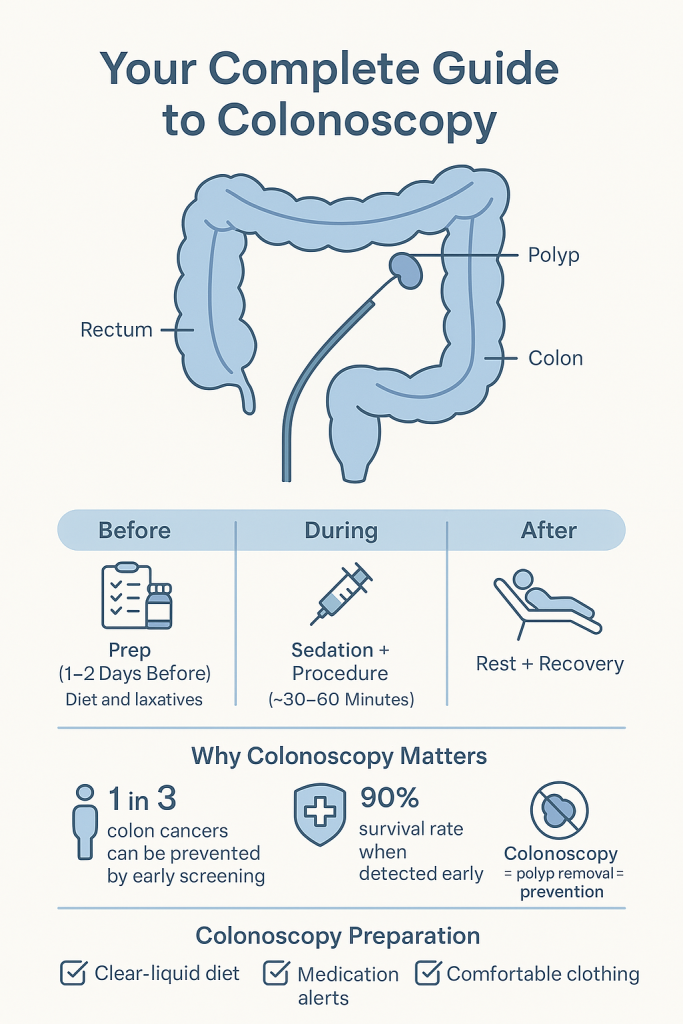Colonoscopy might sound intimidating, but it’s a life-saving procedure that plays a crucial role in detecting and preventing colorectal diseases.
Knowing this process can reduce anxiety and give you the confidence to take control of your health, regardless of whether your doctor has suggested one or
you’re just doing some research.
We’ll explain what a colonoscopy is, why it’s necessary, what to anticipate prior to, during, and following the procedure,
and how it can help prevent serious conditions like colon cancer in this blog.
What Is a Colonoscopy?
A colonoscopy is a diagnostic procedure in which a doctor uses a long, flexible tube equipped with a camera known as a colonoscope to examine the inner lining of your
large intestine (colon and rectum). Its main purpose is to detect alterations like polyps, inflammatory tissue, or cancerous indications.

Why Is a Colonoscopy Important?
Colonoscopy is considered the gold standard for detecting colon cancer early—when it’s most treatable. Here’s why this procedure is essential:
Early Colon Cancer Detection: The majority of colon cancers start off as tiny polyps. These polyps can be found and removed during a colonoscopy before they
develop into cancer.
Early Colon Cancer Detection: The majority of colon cancers start off as tiny polyps. These polyps can be found and removed during a colonoscopy before they
develop into cancer.
Assessment of Symptoms: A colonoscopy can help identify the cause of any abdominal pain, rectal bleeding, or unexplained weight loss.
Screening Tool for Individuals Over 45: According to the American Cancer Society, routine screening should begin at age 45, or earlier if colorectal cancer runs in
the family.
Who Needs a Colonoscopy?
You should consider a colonoscopy if you:
are at least 45 years old (or, depending on family history, younger).
exhibit signs such as constipation, ongoing diarrhea, or rectal bleeding.
possess a history of colorectal cancer or polyps
possess an inflammatory bowel disease (IBD), such as ulcerative colitis or Crohn’s
How to Prepare for a Colonoscopy
Preparation is key to a successful colonoscopy. Here’s what the typical prep process involves:
- Bowel Preparation: You must completely empty your colon. The day before the procedure, you will take the laxative solution that your doctor has prescribed.
This could entail consuming a lot of liquids over a number of hours. - Dietary Restrictions: You will transition to a low-fiber or clear-liquid diet (gelatin, clear juices, and broth) a few days prior to the colonoscopy. A day before your procedure, stay away from solid food.
- Modifications to Medication: Any medications you are taking should be disclosed to your doctor. You might need to temporarily stop taking iron supplements
or some blood thinners.
What Happens During the Procedure?
Colonoscopy is usually performed at a hospital or outpatient clinic. Here’s what to expect:
Sedation: To ensure your comfort, you will be given a mild form of sedation or anesthesia.
Procedure: The process involves inserting the colonoscope through the rectum and carefully passing it through the colon.
The doctor may remove polyps or perform biopsies.
Duration: The entire process typically takes about 30–60 minutes.
After the Colonoscopy: What to Expect
Resume Regular Diet: Unless otherwise instructed, most people can resume their regular diet that same day.
Recovery: You’ll rest in a recovery area until the sedative wears off (usually within an hour).
Bloating or Gas: Mild bloating or cramping is normal due to the air used to inflate the colon during the exam.
Follow-up: Your doctor will discuss the findings and recommend the next course of action if any polyps or abnormal tissue were removed.
Are There Any Risks Involved?
Colonoscopy is generally safe, but as with any medical procedure, there are minor risks:
bleeding, particularly after the removal of polyps
Perforation (a tiny, extremely uncommon tear in the colon wall)
Sedative-related reactions
However, complications are uncommon and the benefits far outweigh the risks—especially for early detection of colorectal issues
FAQs About Colonoscopy
Q. Is a colonoscopy painful?
Ans. No, the majority of patients are sedated and experience minimal discomfort throughout the process.
Q. How often do I need a colonoscopy?
Ans. If you’re at average risk, once every 10 years after age 45. Your doctor may recommend more frequent exams if you have risk factors.
Q. Can I go to work the next day?
Ans. Yes, but because of the sedation, it’s best to avoid going on the day of the procedure. The next day, most people get back to their regular activities.
Final Thoughts: Don’t Delay Your Colon Health
A colonoscopy isn’t just a test—it’s a proactive step toward a healthier future. Detecting polyps and preventing colon cancer before symptoms appear can save your life.
If you’re over 45 or have any risk factors, talk to your healthcare provider today about scheduling your screening at Colon and Health Specialists LLC.
